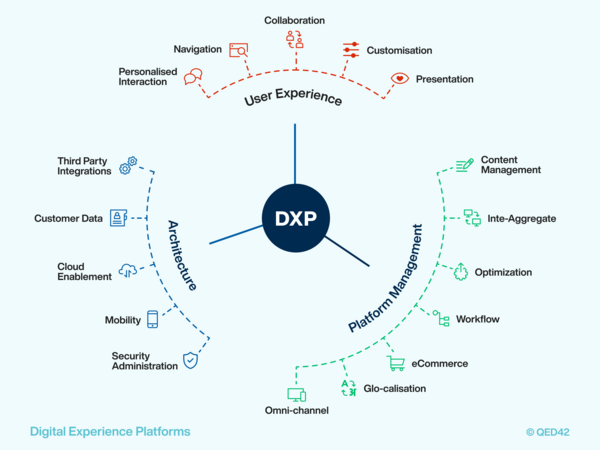Discover DXP: The Future of Web Development – Kinematic Digital

The web development industry is ever-changing, presenting opportunities to improve the user experience with each new advancement. The latest buzzword in this space is DXP or Digital Experience Platform. If you’re curious about what DXP is and how it can benefit your business, look no further. This blog post delves into the intricacies of DXP, from its basic components to how it differs from CMS and WEM. It also highlights the exceptional advantages of using a DXP, its role in experience management, and the upcoming trends in this technology.
The ultimate goal of a DXP is to provide a unified platform that enables businesses to deliver seamless digital experiences across multiple channels. Unlike traditional content management systems (CMS) that focus solely on content creation and publishing, DXPs offer advanced features such as personalization, multichannel delivery, analytics, and integration capabilities.
DXPs are designed to help businesses create customized digital experiences that cater to customers’ individual preferences and needs. They enable organizations to collect data on customer behavior and use that information to provide personalized content and recommendations at every touchpoint along the customer journey.
DXPs also play a crucial role in experience management by providing businesses with a holistic view of their customers’ interactions across different channels. By centralizing data from various touchpoints, businesses can gain insights into customer behavior patterns and make informed decisions about their marketing strategies.
Looking ahead, the future of DXPs is promising, with more businesses adopting this technology to enhance their customers’ digital experiences. As customer expectations continue to rise, DXPs will play an increasingly important role in helping businesses stay competitive by delivering personalized experiences at scale.
Understanding Digital Experience Platform (DXP)
A Digital Experience Platform (DXP) is an all-encompassing tool that amalgamates various components such as content management systems, analytics, commerce, and personalization to enhance the customer experience. By managing digital touchpoints across different channels, it provides customers with seamless interactions with businesses.
The power of DXP lies in its API integration with other systems, which allows for efficient data flow. Marketers can use DXP to optimize content, personalize experiences, and drive e-commerce, leading to increased efficiency, cost savings, and customer satisfaction. As a future-forward solution for web development, adopting DXP enables businesses to provide scalable and personalized customer experiences.
By harnessing the capabilities of DXP, companies can take their digital operations to the next level while benefitting from features like email marketing, search engine optimization, and cross-channel data analysis. With competition heating up in every industry sector, DXP offers businesses a game-changing advantage when it comes to staying ahead of the curve.
The Evolution of DXP and its Increasing Popularity
DXP has undergone significant evolution, expanding beyond traditional CMS to encompass customer data, analytics, and automation. According to Gartner, DXPs are predicted to dominate the market by 2025. Businesses now rely on DXPs to deliver consistent experiences across various digital channels. The future of DXP is heavily influenced by machine learning and AI, shaping its capabilities and potential. With a centralized platform for managing content, commerce, and customer data, DXPs offer numerous benefits like increased efficiency, improved customer satisfaction, and better data insights. As businesses increasingly recognize the value of DXPs, the popularity of this digital experience platform continues to soar. By leveraging the power of DXPs, organizations can stay at the forefront of new technologies, enhance customer engagement, and drive their business operations to the next level.
How is DXP Different from CMS and WEM?
DXP stands apart from CMS and WEM as it integrates analytics, commerce, and personalization. Unlike CMS, DXP provides a holistic view of customers across touchpoints and enables seamless integration of third-party tools. With its focus on data-driven insights and optimization, DXP offers enhanced customer experiences
The Unique Advantages of Using a DXP
DXP, or Digital Experience Platform, offers unique advantages that can revolutionize your business’s online presence. One of the key advantages is the ability to create personalized experiences based on customer data. With DXP, marketers can leverage this data to tailor content and offerings, increasing engagement and customer satisfaction. Automation is another advantage of DXP, streamlining marketing processes and saving valuable time and resources. Additionally, DXPs provide real-time analytics and insights, empowering businesses to make data-driven decisions for better outcomes. The personalization tools within DXP also contribute to improved customer satisfaction and higher conversion rates. Moreover, DXP offers scalability, allowing businesses to adapt and grow according to changing customer needs. Unlike traditional CMS/WEM, DXP provides a comprehensive view of the customer journey, enabling businesses to enhance the overall online experience by seamlessly integrating all digital touchpoints.
Core Components of a DXP
Core Components of a DXP are integral to its functionality. At the foundation, the Content Management System (CMS) allows for efficient creation and management of digital content. Analytics provides valuable insights into customer behavior and content performance, empowering businesses with data-driven decision-making. Commerce functionality enables seamless e-commerce capabilities within the DXP, facilitating online transactions and enhancing the customer experience. Optimization tools play a crucial role in improving conversions and optimizing customer journeys by analyzing and fine-tuning various touchpoints. Customer Data Platforms (CDPs) ensure unified customer data management, enabling businesses to have a centralized view of their customers across channels. Digital Asset Management (DAM) serves as a centralized hub for efficiently managing digital assets like images, videos, and documents. Integration is another critical component, allowing for seamless integration with other business systems such as CRM and ERP. The combination of these core components forms the backbone of a comprehensive and powerful Digital Experience Platform.
Experience Management with DXP
Digital Experience Platform (DXP) is a vital tool for end-to-end customer experience management. Marketers can leverage DXP to create, manage, and optimize digital experiences according to their specific needs. With seamless integration with marketing automation and personalization tools, DXP enhances the overall effectiveness of marketing campaigns. Moreover, DXP provides customer portals that facilitate self-service and engagement, ensuring consistent experiences across various digital touchpoints.
Experience management with DXP allows businesses to analyze user behavior in real-time, tailoring experiences accordingly to ensure maximum engagement. By integrating data from multiple sources and leveraging machine learning, DXP optimizes customer interactions and facilitates personalized and engaging experiences across multiple channels.
In addition to the benefits mentioned above, DXP also helps businesses stay ahead of the competition by providing them with an edge in the digital space. It enables businesses to create meaningful connections with their customers by providing memorable experiences that are tailored to their specific needs. Furthermore, DXP empowers businesses to make data-driven decisions by providing insights into customer behavior, preferences, and feedback.
In conclusion, DXP is a powerful tool that can take your digital strategies to the next level by providing a comprehensive approach towards managing end-to-end customer experience. It offers businesses unparalleled opportunities for growth and success in today’s ever-evolving digital landscape.
The Role of Artificial Intelligence in DXP
AI plays a crucial role in enhancing the personalization and automation capabilities of DXPs. With machine learning algorithms, DXPs improve content recommendations and provide valuable customer insights. AI-powered chatbots and virtual assistants in DXPs revolutionize customer service by offering seamless and efficient support. Leveraging AI, DXPs deliver relevant and contextual experiences to users, enhancing their overall satisfaction. AI-driven analytics in DXPs provide marketers with valuable and actionable insights, enabling them to make data-driven decisions. DXPs are leveraging AI algorithms for personalized user experiences, leveraging data such as past interactions, search patterns, and browsing behavior. By harnessing the power of AI, DXPs are taking customer experiences to the next level, optimizing business operations and driving customer loyalty.
The Future Trends in DXP
The future of digital experience platforms (DXPs) lies in adopting a composable architecture for increased flexibility and customization. Integration with emerging technologies like the Internet of Things (IoT) and Artificial Intelligence (AI) will further enhance the capabilities of DXPs, enabling businesses to deliver seamless and personalized experiences. Additionally, there will be a focus on delivering consistent experiences across both offline and online channels, ensuring that customers receive a cohesive brand experience. As the adoption of composable DXPs continues to grow, businesses can expect increased agility and innovation in their digital operations. DXP vendors will also offer more industry-specific solutions and use cases, catering to the unique needs of different sectors. The future of DXP is exciting, with endless possibilities for innovation and advancement, making it an essential component of the next level of web development and digital experiences.
Is DXP the Right Choice for Your Business?
Considering your business requirements and digital maturity is crucial before adopting a DXP. Evaluate factors like scalability, total cost of ownership, and vendor support. Businesses with complex digital operations and multiple channels benefit from DXPs. Determine the need for personalization, analytics, and automation in your customer journey. Consult experts or conduct pilot projects to validate DXP suitability. Key considerations include integration capabilities, customization options, and support.
Getting Started with a DXP – A Basic Guide
Identifying your business goals and objectives is the first step to successfully implementing a digital experience platform (DXP). This will help you align your DXP implementation with your overall business strategy. After that, conducting a thorough analysis of your existing digital infrastructure and systems is crucial. It will help you understand what needs to be improved and how a DXP can fill those gaps.
Once you have identified your goals and analyzed your existing systems, it’s time to choose the right DXP vendor. Look for a vendor that aligns with your specific business requirements and budget. Consider factors like integration capabilities, customization options, and support.
Defining key performance indicators (KPIs) is essential for measuring the success of your DXP implementation. These KPIs will help you track the impact of your DXP on user engagement and business outcomes. Collaborating with internal teams and stakeholders will ensure a smooth rollout of your DXP, as their insights and expertise can help overcome any challenges.
Finally, it’s important to regularly optimize your DXP based on the key performance indicators you defined earlier. This will ensure continuous improvement in user engagement and overall business success. By following these steps, you will be well on your way to getting started with a DXP and reaping its benefits.
Transforming Customer Journeys with DXP
DXP, or Digital Experience Platform, is reshaping how businesses interact with customers in the digital landscape. By harnessing the power of personalized content, analytics, and optimization, DXP revolutionizes customer experiences across various digital channels. It seamlessly integrates components such as CMS, commerce, and analytics to deliver immersive and consistent digital experiences. Leveraging APIs and customer data, businesses can engage in targeted marketing strategies and ensure improved customer satisfaction. DXP empowers organizations to streamline their operations, optimizing business processes and enhancing overall efficiency. Whether it’s through email marketing, search engine optimization, or innovative technologies like digital billboards and kiosks, DXP takes customer journeys to the next level. With features like retention and customer loyalty, combined with the convenience of single-vendor solutions like Sitecore, Sitefinity, and Optimizely, DXP is a game-changer for businesses looking to thrive in today’s competitive online market. Transform your customer journeys with DXP and unlock new possibilities for your business.
Why is DXP Considered as the Future of Web Development?
DXP is considered the future of web development due to its ability to adapt to evolving customer expectations and digital touchpoints. With machine learning and AI, it enables personalized experiences. DXP empowers businesses to optimize SEO, support omnichannel experiences, and integrate with existing IT infrastructure. Gartner and Forrester recognize DXP as crucial for digital transformation.
How Does DXP Enhance the User’s Digital Experience?
DXP enhances the user’s digital experience by providing user-friendly interfaces, intuitive navigation, and personalized content delivery. It seamlessly integrates with customer portals and social platforms while offering scalability through composable architecture. With easy integration of third-party tools and efficient content management, DXP ensures a personalized experience for users.
Conclusion
DXP is transforming web development by providing a comprehensive and seamless digital experience for users. Its advanced features and capabilities offer unique advantages over traditional CMS and WEM platforms. Artificial intelligence-powered experience management plays a critical role in enhancing user experiences and personalizing interactions. DXP is undoubtedly the future of web development, poised to revolutionize customer journeys and elevate the overall digital experience.
To stay ahead in the digital landscape and provide exceptional user experiences, DXP is an excellent choice for businesses. With its cutting-edge technology, it can unlock the full potential of your digital presence. If you’re looking to take advantage of this new era of web development, now is the time to get started with DXP. Make sure your business stays ahead of the competition by embracing this innovative technology today!












